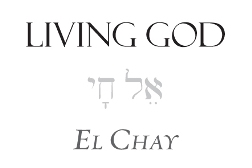From Praying the Names of God Week Nineteen, Day One
The Name
This title sets Israel's God apart from the false gods of the surrounding nations. Unlike idols of wood and stone, made by human hands, the Living God is himself Maker of heaven and earth. He alone is the source of our life. We live because he lives. The prophet Jeremiah reminded God's people that "every goldsmith is shamed by his idols. His images are a fraud; they have no breath in them" (Jeremiah 10:14).
Key Scripture
And Hezekiah prayed to the LORD: "O LORD, God of Israel, enthroned between the cherubim, you alone are God over all the kingdoms of the earth. You have made heaven and earth. Give ear, O LORD, and hear; open your eyes, O LORD, and see; listen to the words Sennacherib has sent to insult the living God." (2 Kings 19:15-16)
***
Monday
GOD REVEALS HIS NAME
Now Sennacherib received a report that Tirhakah, the Cushite king of Egypt, was marching out to fight against him. So he again sent messengers to Hezekiah with this word: "Say to Hezekiah king of Judah: Do not let the god you depend on deceive you when he says, ‘Jerusalem will not be handed over to the king of Assyria.' Surely you have heard what the kings of Assyria have done to all the countries, destroying them completely. And will you be delivered? Did the gods of the nations that were destroyed by my forefathers deliver them: the gods of Gozan, Haran, Rezeph and the people of Eden who were in Tel Assar? Where is the king of Hamath, the king of Arpad, the king of the city of Sepharvaim, or of Hena or Ivvah?"
Hezekiah received the letter from the messengers and read it. Then he went up to the temple of the LORD and spread it out before the LORD. And Hezekiah prayed to the LORD: "O LORD, God of Israel, enthroned between the cherubim, you alone are God over all the kingdoms of the earth. You have made heaven and earth. Give ear, O LORD, and hear; open your eyes, O LORD, and see; listen to the words Sennacherib has sent to insult the living God.
"It is true, O LORD, that the Assyrian kings have laid waste these nations and their lands. They have thrown their gods into the fire and destroyed them, for they were not gods but only wood and stone, fashioned by men's hands. Now, O LORD our God, deliver us from his hand, so that all kingdoms on earth may know that you alone, O LORD, are God.". . .
That night the angel of the LORD went out and put to death a hundred and eighty-five thousand men in the Assyrian camp. When the people got up the next morning—there were all the dead bodies! So Sennacherib king of Assyria broke camp and withdrew. He returned to Nineveh and stayed there.
One day, while he was worshiping in the temple of his god Nisroch, his sons Adrammelech and Sharezer cut him down with the sword, and they escaped to the land of Ararat. And Esarhaddon his son succeeded him as king. (2 Kings 19:9-19, 35-37)
Lord, you are a God who speaks, who hears, and who acts.Thank you for making me and breathing life into me. Please watch over me and hear me when I cry out to you; deliver me from my enemies and glorify your name so that everyone who knows me may know that you alone are El Chay, the Living God.Amen.
Understanding the Name
Scripture constantly warns against the worship of false gods. The first of the Ten Commandments is itself a proscription against idol worship. The title El Chay (EL CHAY), the Living God, emphasizes God's role as Creator of all that is, in contrast with idols made of metal, wood, or stone, which are merely the creations of human hands. Jeremiah paints a vivid picture, saying, "The customs of the peoples are worthless; they cut a tree out of the forest, and a craftsman shapes it with his chisel. They adorn it with silver and gold; they fasten it with hammer and nails so it will not totter. Like a scarecrow in a melon patch, their idols cannot speak; they must be carried because they cannot walk. Do not fear them; they can do no harm nor can they do any good" (Jeremiah 10:3-5). Imagine praying to a deaf and dumb god! That's exactly the case when someone worships any other God than El Chay!
Studying the Name
- Sennacherib ruled Assyria and Babylonia from 705-681 B.C. He invaded Judah in 701 B.C. and threatened to attack Jerusalem when King Hezekiah refused to pay taxes. How does Hezekiah's prayer reflect his understanding of the "Living God"?
- Though Hezekiah asked God to deliver his people from their enemies, his prayer primarily focused on God's honor. How can his prayer be a model for ours?
- How can this story of Hezekiah's reliance on the Living God to defend his people be applied in the lives of God's people today? In your own life?
For more from Ann Spangler, please visit her blogspot on Christianity.com. And be sure to check out Ann's newest books on AnnSpangler.com. To hear more from Ann Spangler, sign up today at annspangler.substack.com.
Meet your spiritual ancestors as they really were: Less Than Perfect: Broken Men and Women of the Bible and What We Can Learn from Them.

